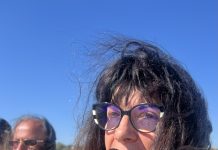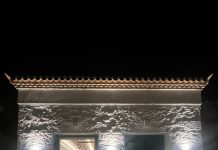A discussion with Peter Sragher
Liana Sakelliou – who is a well-known poet & professor in Romania where she was invited several times to either read from her books that appeared in bilingual editions in our country or to give a lecture at The Bucharest University – very recently again invited, this time to an original international poetry festival: ”Poetry in the Sand” on the shores of the Black Sea organised with love and professionally by poet & teacher Daniela Varvara and poet & visual artist Iulia Pană. In a small village on the shore of The Black Sea that would make Edgar Allan Poe jealous (because it bears the name Corbu, that is Raven) with a wonderful wild beach where one can watch not only seagulls, herons, eventually pelicans and wild geese, during the spring and summer, but also ravens, all year long have their home. I had an idea during the warm wind-woven days: to ask Liana Sakelliou several questions – if the wind doesn’t steal them from my mouth and throws them into the salty waters – and the questions were hot as sand, deep as the wild, coloured as the broken seashells, listening to the raging waters of the Black Sea and filled with the foam of the waves. And here they are, the questions, but also the answers that were stronger than the salty wind. The first time the Romanian lovers o poetry read her poems was in an article years ago published in our review – https://www.fitralit.ro/wp-login.php?loggedout=true&wp_lang=ro_RO. See also newer poems from the already mentioned book due to appear in Bucharest in this issue of our review: https://www.fitralit.ro/30-09-2025-liana-sakelliou-tiare-and-omens/ (Peter Sragher)
***
You are really well known in Romania, because two poetry collections already appeared here in bilingual editions at the well-known and appreciated Vinea Publishing House. A third one will appear soon at the same publisher, for the first time in a trilingual edition—Greek, and the Romanian and English translations.
At the same time, I feel drawn to the works of Romanian writers whose voices have reached me. There is a lyrical beauty in the Romanian language. I first sensed it in 2006, at an International Festival in Coimbra, Portugal, when Ana Blandiana read her poems in Romanian—her beautiful, expressive voice captivated every listener. Later, I discovered a collection of Romanian women poets translated into Greek, and through it encountered Liliana Ursu’s luminous work. Her poetry revealed to me the intricate weave between topos and psyche, the way she rooted her vision in place yet let it resonate across cultures—Greek, American, and beyond. Her profound and tender connection to Greece is evident in how she renders her experiences, her observations, her aspirations for the country. I longed to meet her. Thirty years later, in Brașov, I finally did—I had found a friend.

There is a lyrical beauty in the Romanian language
Moreover, you were invited several times in our country, the first time in Galați at the ”International Poetry Festival Poetry—a Harbour to the Danube” as early as 2018 and then to present your poetry collections in Bucharest, Brașov and Constanța. You read once in front of the students of The Greek Department and the students of The Romanian Literature Department of The Bucharest University, you read your poetry in the elegant Aula of The ”Charles the 1st” Library in Bucharest, at The County Library ”Ioan N. Roman” in Constanța, as recent as this month you were a guest of the 6th Edition of The International Poetry Festival in the village Corbu and city of Constanța. We can say that you have become half Romanian.
I feel a bond with many Romanians, a bond that deepens as the years pass. There are affinities of a psychic kind between Greece and Romania—the two countries could hardly be more alike. Each stands within a fragile Europe, an even more fragile eurozone; each fiercely proud of its independence wrested from age-old dominant neighbors, each proud of its historic gift to European culture. To love the strengths of modern Romania and to mourn its weaknesses is, for me, inseparable—just as it is with my own country.
This third poetry collection impressed me beyond words, but I will try to utter some, ha, ha.. Your incredible bond to the old Greek mythology made me often feel that I re-live the myths you are referring to, so powerful is your poetry. Your words become akk if a sudden a ravaging tempest, your words become passion and deepest love, your words become a fight for life, where the blood is a witness to history. How come that you got so close to the ancient history of Greece?
The Acropolis silently participated in my daily existence
All my life, I have felt ancient Greek culture surrounding me. The Parthenon dominates the landscape of Athens; I was born there, and for half my life I lived in its center. You could say the Acropolis silently participated in my daily existence—visible day and night from almost everywhere, a presence both quiet and profoundly evocative. Each summer, ancient tragedies are performed in open-air theatres, and we make our way to Epidaurus or to the Theatre of Dionysos to watch them. This summer, my family and I returned to Epidaurus for the Oresteia—three hours of performance that once again filled our lives with a sense of magic.
From childhood, the ancient Greek language and literature formed an integral part of my education; at the University of Athens, I deepened that journey through classical studies. But the connection is not only scholarly. The sea, the mountains, the forests—all echo the landscapes of ancient poetry. And above all, the Attic air, so pure and crystalline, is the air I breathe each day.
Even if you retired from the National and Kapodistrian University of Athens, you still feel the need to impart from your experience in poetry writing. So that you continue to teach creative writing at The Takis Sinopoulos Foundation in Athens. A couple of years ago, I had the opportunity to meet two of your students that were thrilled to attend your workshops. You brought to them, as yes, they confessed to me ”inspiration”.
I have been inspired by many poets and writers. Whenever I encounter a poem that moves me, I feel compelled to continue it somehow—to answer it, to write something of my own. That, to me, is the purpose of poetry: to awaken, to ignite, to inspire. I have deeply enjoyed the way you inhabit your poems when you read them. Your engagement stirs me—it makes me want to be equally engaged in my own writing.
The Island Poros is a form of eternity
Poros Island is so important to you, as you often went there with your relatives as a child. It was also an important place for a famous Greek writer and you were inspired by him to write a whole poetry collection. How come that Poros Island is so inspiring for you?
Poros is eternal for me. It is not only a place but a pulse, a constant reference point in the map of my life. I have gone there year after year—long summers steeped in sunlight, Easters marked by ritual and renewal, fleeting visits that still left their glow. Each return is a thread that binds me to family, to friends, to moments that refuse to fade.
Poros is the soil that has nurtured me, its earth and sea shaping my reverence for natural beauty. The island is both anchor and horizon: the scent of eucalyptus and pine carried by the wind, the shimmer of the sea at dusk, the timeless rhythm of waves against the shore outside my house. It is where memory and presence merge, where the past breathes alongside the present. For me, Poros is not simply a place—it is continuity, belonging, and a form of eternity.













